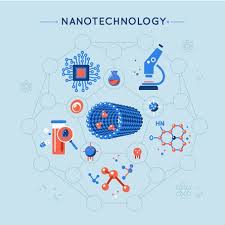Nanotechnology is the manipulation of matter on an atomic and molecular scale, typically between 1 and 100 nanometers. This field of science and engineering has the potential to revolutionize various industries and improve our lives in countless ways.
Benefits of Nanotechnology
- Medicine:
- Targeted Drug Delivery: Nanoparticles can deliver drugs directly to target cells, reducing side effects and improving treatment efficacy.
- Tissue Engineering: Nanomaterials can be used to create scaffolds for tissue regeneration, offering hope for patients with injuries or diseases.
- Medical Imaging: Nanoparticles can enhance imaging techniques, allowing for earlier detection and diagnosis of diseases.
- Electronics:
- Smaller and Faster Devices: Nanotechnology enables the creation of smaller and more efficient transistors, leading to faster and more powerful computers and electronic devices.
- Flexible Displays: Nanomaterials can be used to create flexible and transparent displays, opening up new possibilities for wearable technology and electronic devices.
- Energy Storage: Nanotechnology can improve the performance of batteries and other energy storage devices.
- Environmental Applications:
- Water Filtration: Nanofiltration membranes can remove contaminants from water more efficiently and cost-effectively.
- Pollution Control: Nanotechnology-based materials can be used to clean up pollutants in air and water.
- Solar Energy: Nanomaterials can increase the efficiency of solar cells.
- Consumer Products:
- Textiles: Fabrics treated with nanomaterials can become stain-resistant, water-repellent, and antibacterial.
- Cosmetics: Nanotechnology can create more effective and longer-lasting cosmetics.
- Sports Equipment: Nanomaterials can improve the performance of sports equipment, such as golf clubs and tennis rackets.
- Industrial Applications:
- Materials Science: Nanotechnology can be used to create new materials with enhanced properties, such as increased strength, conductivity, and durability.
- Manufacturing: Nanotechnology can improve manufacturing processes, such as by creating self-assembling materials or using nanoscale tools.
While nanotechnology offers immense potential, it is essential to address the associated challenges and risks, such as safety concerns and environmental impacts. As research and development continue, we can expect to see even more innovative and exciting applications of nanotechnology in the years to come.
